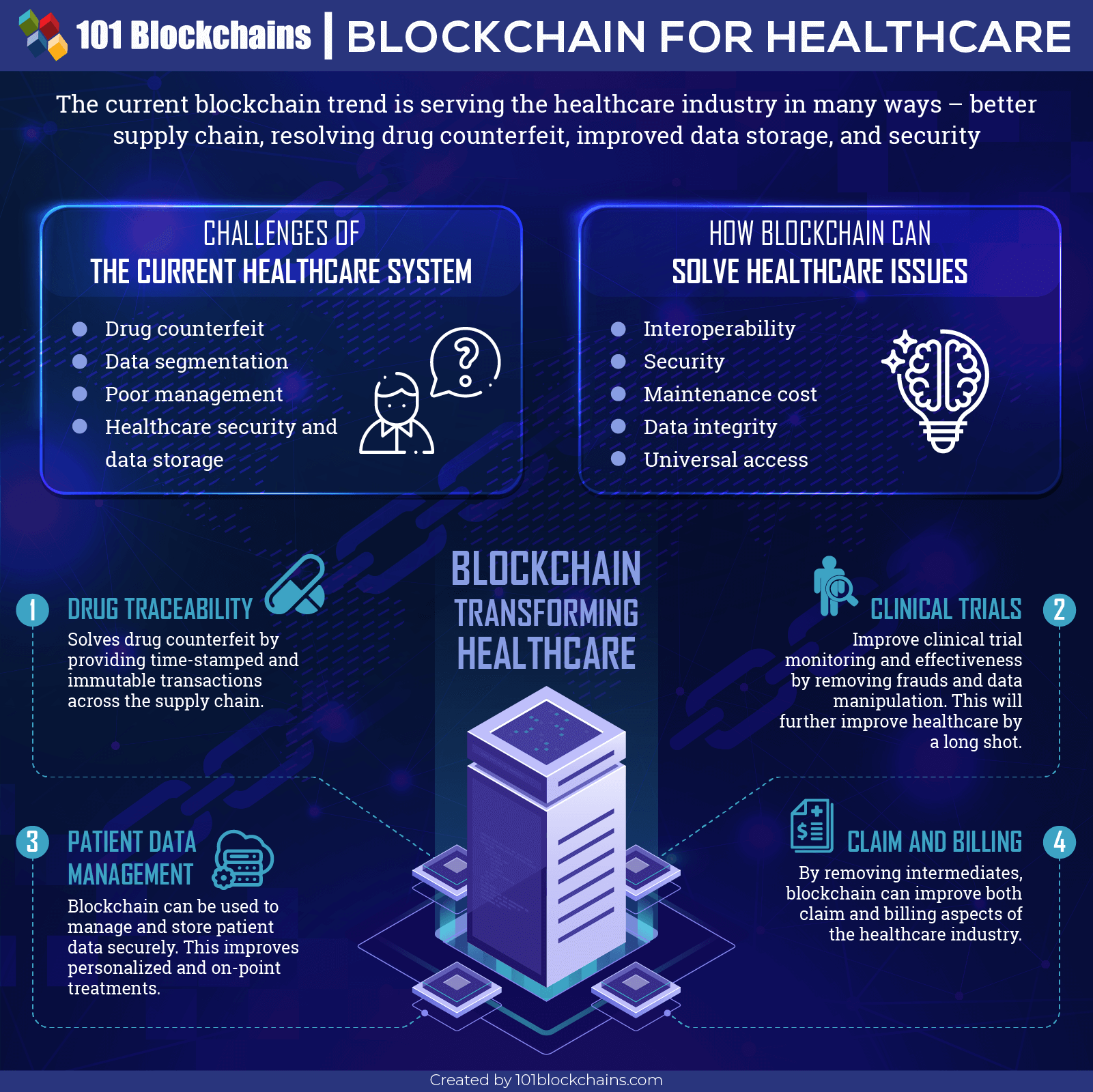Blockchain in Healthcare: Protecting Patient Data and Improving Medical Supply Chains

Blockchain technology is at the forefront of digital innovation and has the potential to revolutionize many industries, including healthcare. As the world becomes increasingly digitized, we must consider how we can leverage the unique features of blockchain technology to improve the way we deliver and receive healthcare. In this article, we’ll explore some possible use cases for blockchain in healthcare and how this technology can help to improve the delivery of healthcare services.
Blockchain Infographic
The infographic above highlights some of the ways in which blockchain technology can be used in healthcare. The healthcare industry is one that deals with sensitive personal information on a daily basis, and blockchain technology can provide an innovative way to secure and protect this information. The use of blockchain can help to reduce the risk of data breaches and ensure that data is secure and cannot be tampered with.

Blockchain in Healthcare
As the world continues to shift towards a more digitized era, the healthcare industry is embracing the potential benefits of blockchain technology. One of the major advantages of blockchain is the ability to create a tamper-proof and secure digital ledger of transactions. This can be applied to electronic medical records, prescriptions, and other sensitive medical data.
By using blockchain technology, healthcare providers will be able to safeguard their patients’ data from unauthorized access, breaches, and theft. With the use of encryption and hashing algorithms, electronic medical records could be kept both private and secure. This means patients can be assured that their sensitive health information is safe and cannot be tampered with.

Blockchain Innovation in Healthcare and Life Sciences
The healthcare industry is one that can greatly benefit from the use of blockchain technology. By using blockchain, medical professionals and patients alike can enjoy the benefits of better data security, privacy, and transparency. In addition, blockchain can help to improve the overall quality of healthcare services by ensuring that medical records are accurate, standardized, and up-to-date.
Perhaps one of the most exciting applications of blockchain technology in healthcare is the concept of a decentralized healthcare platform. This would be a platform where patients and healthcare providers can share and access medical data in a secure and transparent way. This would greatly reduce the need for paper-based medical records, and also improve the speed and accuracy of diagnoses and treatment.

Blockchain for Healthcare: Use Cases and Applications
Blockchain technology can be used in healthcare in a variety of ways, from electronic medical records to secure identity management. Here are just a few potential use cases and applications of blockchain in healthcare:
- Electronic Medical Records (EMRs): By using blockchain technology, patient medical records can be kept secure and anonymous, while still allowing healthcare providers to access the information they need.
- Supply Chain Management: Blockchain can be used to ensure that medical supplies, drugs, and other healthcare items are authentic and safe for use.
- Data Exchange: Blockchain can be used to create a decentralized platform for medical data exchange, ensuring patient data is secure while allowing for all relevant parties to access the information they need.
- Interoperability: Blockchain can help to ensure that medical data is standardized and interoperable, making data transfer easier, faster, and more reliable.

How Blockchain is Totally Changing Healthcare
Blockchain technology has the potential to totally transform how healthcare is delivered and consumed. By creating a decentralized network that is secure, transparent, and provides real-time access to relevant medical data, blockchain can ensure that patients receive better care and medical professionals can provide more accurate diagnoses and treatment plans.
One of the major advantages of blockchain technology is its ability to create a tamper-proof digital ledger of transactions. This is highly relevant in the healthcare industry, where security and data privacy are of utmost importance. By using blockchain, healthcare providers can ensure that their patients’ data is secure and cannot be tampered with.
Another key advantage of blockchain technology is its ability to create a decentralized platform for medical data exchange. By using a decentralized platform for medical data exchange, healthcare providers can ensure that patient data is always up-to-date, accurate, and easily accessible by all relevant parties.
In conclusion, blockchain technology has the potential to revolutionize the healthcare industry by providing a secure, transparent, and decentralized platform for medical data exchange. With its unique features, blockchain can help to improve the delivery of healthcare services, reduce the risk of data breaches, and improve patient outcomes. As the world continues to shift towards a more digitized era, the healthcare industry must embrace the potential benefits of blockchain technology to ensure that patients receive the best possible care.

Source image : www.harbus.org

Source image : www.usfhealthonline.com

Source image : medium.com

Source image : www.huffpost.com

Source image : 101blockchains.com







